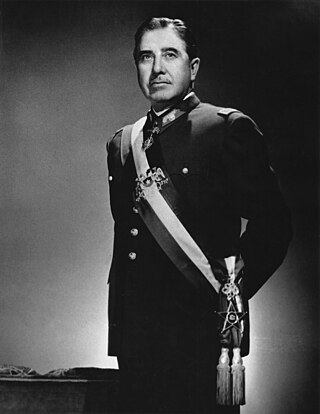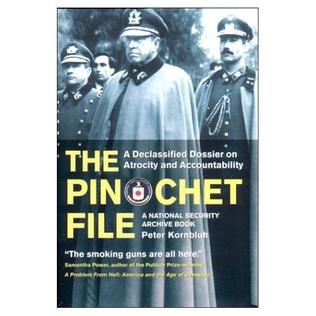
Salvador Guillermo Allende Gossens was a Chilean physician and socialist politician, who served as the 28th president of Chile from 1970 until his death in 1973. As a democratic socialist committed to democracy, he has been described as the first Marxist to be elected president in a liberal democracy in Latin America.

Richard McGarrah Helms was an American government official and diplomat who served as Director of Central Intelligence (DCI) from 1966 to 1973. Helms began intelligence work with the Office of Strategic Services during World War II. Following the 1947 creation of the Central Intelligence Agency (CIA), he rose in its ranks during the presidencies of Truman, Eisenhower and Kennedy. Helms then was DCI under Presidents Johnson and Nixon, yielding to James R. Schlesinger in early 1973.

Donald Mcintosh Kendall was an American businessman and political adviser. He served as CEO of Pepsi Cola and as CEO of PepsiCo from 1971 to 1986.

Charles Edmund Lazar Horman was an American journalist and documentary filmmaker. He was executed in Chile in the days following the 1973 Chilean coup d'état led by General Augusto Pinochet, which overthrew the socialist president Salvador Allende. Horman's death was the subject of the 1982 Costa-Gavras film Missing, in which he was portrayed by actor John Shea.
United States intervention in Chilean politics started during the War of Chilean Independence (1812–1826). The influence of United States in both the economic and the political arenas of Chile has since gradually increased over the last two centuries, and continues to be significant.

The 1973 Chilean coup d'état was a military overthrow of the Popular Unity government in Chile led by the democratic socialist Salvador Allende as president of Chile. Allende, who has been described as the first Marxist to be democratically elected president in a Latin American liberal democracy, faced significant social unrest, political tension with the opposition-controlled National Congress of Chile, and economic warfare ordered by United States president Richard Nixon. On 11 September 1973, a group of military officers, led by General Augusto Pinochet, seized power in a coup, ending civilian rule. In 2000, the CIA admitted its role in the 1970 kidnapping of René Schneider, who had refused to use the army to stop Allende's inauguration. 2023 declassified documents showed that Nixon, Henry Kissinger, and the United States government, which had branded Allende as a dangerous communist, were aware of the coup and its plans to overthrow Allende's democratically-elected government.

Presidential elections were held in Chile on 4 September 1970. Salvador Allende of the Popular Unity alliance won a narrow plurality in a race against independent Jorge Alessandri and Christian Democrat Radomiro Tomic, before having his victory confirmed by a Congressional vote after the Christian Democrats voted in favour of his candidacy.

An authoritarian military dictatorship ruled Chile for seventeen years, between 11 September 1973 and 11 March 1990. The dictatorship was established after the democratically elected socialist government of Salvador Allende was overthrown in a coup d'état backed by the United States on 11 September 1973. During this time, the country was ruled by a military junta headed by General Augusto Pinochet. The military used the breakdown of democracy and the economic crisis that took place during Allende's presidency to justify its seizure of power. The dictatorship presented its mission as a "national reconstruction". The coup was the result of multiple forces, including pressure from conservative groups, certain political parties, union strikes and other domestic unrest, as well as international factors.

Salvador Allende was the president of Chile from 1970 until his suicide in 1973, and head of the Popular Unity government; he was a Socialist and Marxist elected to the national presidency of a liberal democracy in Latin America. In August 1973 the Chilean Senate declared the Allende administration to be "unlawful," Allende's presidency was ended by a military coup before the end of his term. During Allende's three years, Chile gradually transitioned into a socialist state.

General René Schneider Chereau was the commander-in-chief of the Chilean Army at the time of the 1970 Chilean presidential election, when he was assassinated during a botched kidnapping attempt. He coined the doctrine of military-political mutual exclusivity that became known as the Schneider Doctrine.

Project FUBELT is the codename for the secret Central Intelligence Agency operations that were to prevent Salvador Allende's rise to power before his confirmation and to promote a military coup in Chile. This project came after the circumstantial failure of Track I, which involved making president Eduardo Frei Montalva interfere with the 1970 national election in opposition to Allende.

The Fatherland and Liberty Nationalist Front was a Chilean fascist, political and paramilitary group that fought against the democratically elected Popular Unity government of Salvador Allende, in Chile.

The Government Junta of Chile was the military junta established to rule Chile during the military dictatorship that followed the overthrow of President Salvador Allende in the 1973 Chilean coup d'état. The Government Junta was the executive and legislative branch of government until December 17, 1974, when Augusto Pinochet rose was formally declared President of Chile in late 1974. After that date, it functioned strictly as a legislative body until the return to democracy in 1990.
Henry D. Hecksher was a career United States intelligence officer who served in both the OSS and CIA.
Thomas Hercules Karamessines was the Deputy Director for Plans of the United States Central Intelligence Agency from July 31, 1967 until February 27, 1973. Karamessines was actively involved in the Agency's Project FUBELT to undermine the government of Chilean president Salvador Allende.

Salvador Allende is a 2004 documentary film about Chilean president Salvador Allende, from his election campaign to the coup d'état which ended his life. It was directed by Patricio Guzmán and screened out of competition at the 2004 Cannes Film Festival.

Augusto José Ramón Pinochet Ugarte was a Chilean general and dictator who ruled Chile from 1973 to 1990, first as the leader of the Military Junta of Chile from 1973 to 1981, being declared President of the Republic by the junta in 1974 and becoming the de facto dictator of Chile, and from 1981 to 1990 as de jure president after a new constitution, which confirmed him in the office, was approved by a referendum in 1980. His rule remains the longest of any Chilean leader in history.

The Pinochet File is a National Security Archive book written by Peter Kornbluh covering over approximately two decades of declassified documents, from the Central Intelligence Agency (CIA), Defense Intelligence Agency (DIA), White House, and United States Department of State, regarding American covert activities in Chile. It is based on more than 24,000 previously classified documents that were released as part of the Chilean Declassification Project during the Clinton administration, between June 1999 and June 2000.
Jonathan Haslam is George F. Kennan Professor in the School of Historical Studies at the Institute for Advanced Study in Princeton and Professor of the History of International Relations at the University of Cambridge with a special interest in the former Soviet Union. He has written many books about Soviet foreign policy and ideology.

The participation of the United States in regime change in Latin America involved US-backed coup d'états which were aimed at replacing left-wing leaders with right-wing leaders, military juntas, or authoritarian regimes. Intervention of an economic and military variety was prevalent during the Cold War. Although originally in line with the Truman Doctrine of containment, United States involvement in regime change would increase after the drafting of NSC 68, which advocated more aggressive actions against potential Soviet allies.













